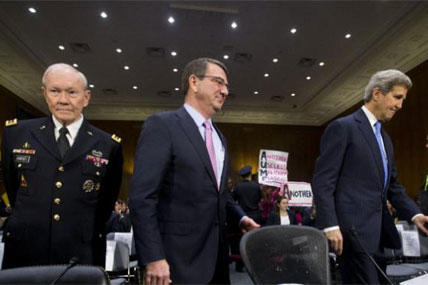Lawmakers from both sides of the aisle argued over the level of detail Congress should include in the Authorization for the Use of Military Force, or AUMF, against ISIS put forth by President Obama last month.
Obama has said his administration was careful not to include specific countries in the legislation in the fight against the Islamic State of Iraq and Syria (ISIS) because he didn't want the terrorist to group to feel safe if the militants crossed certain borders.
Republican senators on the Senate Foreign Relations Committee, which held a hearing Wednesday to discuss the AUMF, argued that the ambiguity in the document left too much unsettled.
Sen. Rand Paul, R-Ky., said he worried the U.S. could expand the fight against ISIS under this AUMF to include other terrorist groups loosely affiliated with ISIS like Boko Haram.
Defense Secretary Ash Carter, Chairman of the Joint Chiefs of Staff Gen. Martin Dempsey, and Secretary of State John Kerry, told members of the committee Wednesday that Congress needed to pass the legislation in order to send a strong message to ISIS and U.S. allies about America's commitment to defeat ISIS.
Many senators noted how the U.S. has launched attacks on ISIS for more than 10 months and it was wrong for Congress to only now be holding a discussion over it. However, Democrats on the committee said it was important not to allow partisan politics to keep Congress from showing U.S. troops their commitment to the fight.
"The authorization should be strong and should be bi-partisan. If we were to pass it in narrow way or a partisan way that would not make the people risking their lives feel very good about the risk that they are taking," said Sen. Tim Kaine, D-Va.
Lawmakers asked Carter and Dempsey whether the language in the AUMF restricting "enduring ground combat operations" would limit the U.S. military's ability to destroy ISIS. The U.S. military's top civilian and uniformed leaders said that was not the case.
Carter told lawmakers the ambiguity of the language in the AUMF could be helpful in providing needed military flexibility to an ongoing effort which may need to adapt to changing threats.
"It does not try to say everything we might have to do – that is a good sensible thing for a military campaign as you don't know everything you would need to do," Carter said.
However, Kerry emphasized a large-scale, long term ground occupation like that which the U.S. has conducted over the last decade would hurt the American cause and only help ISIS recruit more fighters.
"The enduring transformation that has to take place is not going to take place if the United States just comes in and knocks out ISIL. We could do that. We have that capacity – but we are not asking to do that nor are they asking for us to do that -- because the implications of that would be to aid in the recruitment (for ISIS) and create a bigger problem than we face today," Kerry told lawmakers.
Kerry added that any long-term solution to the defeat of ISIS would need to call upon regional Arab involvement and support from U.S. allies in the region.
"This is just what they want and we are not getting suckered into that. That is why we built a 62-nation coalition with Arab countries engaged in the kinetic activities -- to deny them that narrative."
A handful of Arab countries to include Jordan, Saudi Arabia and the United Arab Emirates have all participated in air strikes against ISIS.
However, creating an inclusive future Iraqi government, and bridging the Sunni-Shia divide may prove increasingly challenging as larger numbers of Iranian-backed Shia militias lead the fight against ISIS.
Iran has helped lead an attack on Tikrit to retake the strategic Iraqi city from ISIS. The force put together by Iran includes 20,000 Shia militia members and only 3,000 Iraqi National Security Forces troops.
Dempsey said he was concerned that the Shia force could spark sectarian violence in Tikrit after ISIS is pushed out of the historically Sunni town. In fact, Tikrit had served as the center of power for Saddam Hussein's former Iraq regime that killed and tortured thousands of Shia in Iraq and Iran.
Kerry said the U.S. must continue to work with the Shia-dominated Iraq government to ensure their leaders include Sunni in the government process.
"As long as we continue to work on the internal inclusivity of Iraq and its government as long as we continue to help the Iraqis to be able to do this themselves and help the region feel empowered by it. That is a long-term recipe for the United States not to have as much risk and not to have to put ourselves on the line in the way we have historically," Kerry added.
-- Kris Osborn can be reached at kris.osborn@military.com



























